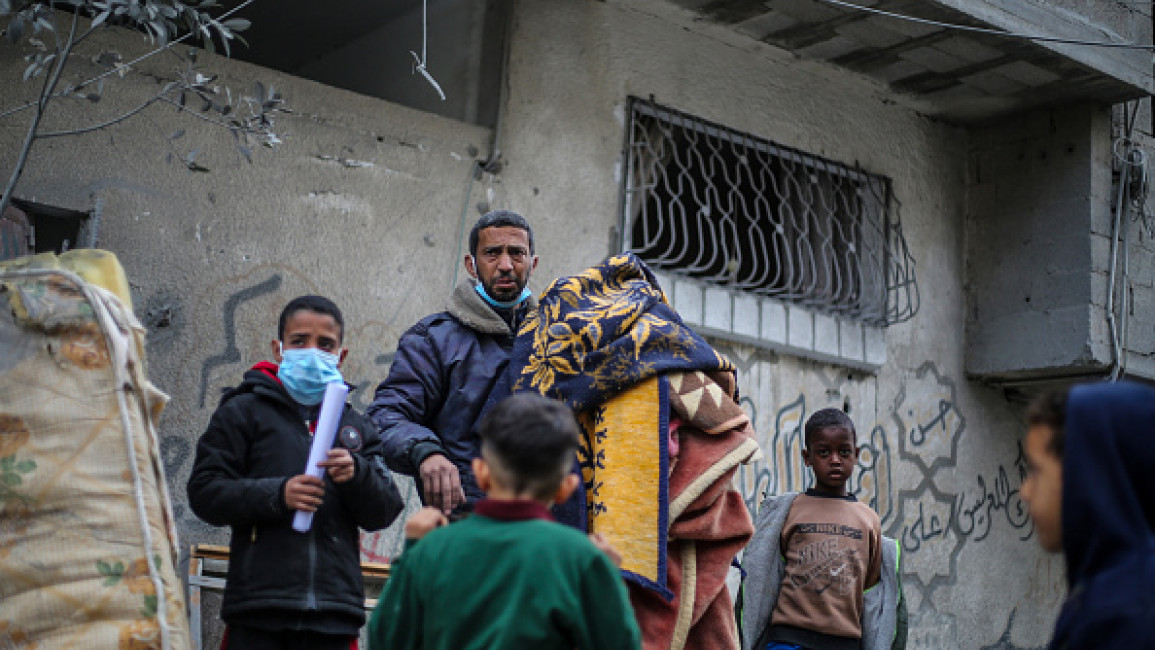Palestinians share memories of loss and displacement to mark Nakba Day
Palestinians took to social media on Wednesday to share stories of loss, displacement, and resilience to mark the 76th commemoration of the Nakba, or catastrophe.
The Nakba, marked on 15 May every year, describes the expulsion of over 750,000 Palestinians from their homes at the hands of violent Zionist militias in 1948, to pave the way for the creation of Israel.
During the Nakba, Palestinians lost their homes, land and were stripped of their rights, in what has now become a traumatic but important point in Palestinian history.
For Palestinians, the Nakba is the ethnic cleansing, forced displacement and process of erasure of them and their land.
Online, Palestinians recalled their family history and how the Nakba impacted their family to mark Nakba Day.
"In 1948, [my grandparents’] hometown Al-Lidd was captured by Israel following a massacre that killed over 400 people. They had 3 children. They were ordered to walk on a death march for three days with no water, food, or anything. 350 died in that walk," one social media user, named Tameem, posted on X.
"Later they reached a refugee camp in Gaza. My dad and his twin cousins were born in a Gaza tent. The twin froze to death in the first winter and dad cheated death. The family decided to leave Gaza, they snuck out of Gaza at night, through newly created Israel," they continued.
The posts go on to describe how the family was forced to make difficult choices to survive, including abandoning babies, before they eventually reached Jordan, where a large Palestinian diaspora exists today as a result of the Nakba.
Today, on Nakba day, I am holding tight to the memories of my Dido and Teta, both of whom were exiled to Gaza in 1948. They met there and had four children, the youngest of whom was born during the 1967 war. Exile carried them to Beirut, and eventually the US pic.twitter.com/InOy8G5Tdj
— dylan saba (@shaabiranks) May 15, 2024
Others shared stories of how they were exiled to other countries.
"Today on Nakba day, I am holding tight to the memories of my Dido and Teta, both of whom were exiled to Gaza in1948. They met there and had four children, the youngest of whom was born during the 1967 war. Exile carried them to Beirut, and eventually the US," another said.
Omar Shakir, the Israel and Palestine director for Human Rights Watch said that Israel’s ongoing bombardment of Gaza makes memories of the Nakba eve more difficult.
"The atrocities and displacement of Gaza’s Palestinians makes this Nakba Day extra hard. Palestinians have right of return under international law to their homes in Gaza and homes they fled/were expelled from in what’s now Israel. Blocking return of Palestinians is part of Israel’s apartheid," he said.
Amnesty International also highlighted Nakba day, saying "the fate of Palestinians is more perilous than ever".
"Dispossessed and subjected to systematic human rights violations under brutal occupation – with those in Gaza also facing the imminent risk of genocide grappling with famine," the rights organisation said.
Khalil Sayegh, a Palestinian political activist in the US also weighed in on Nakba Day, sharing his family’s story.
"During Nakba, my grandfather lost his home, shop, and all his property, he also lost his property. He also lost his brother as he was walking to Gaza from Majdal. In Gaza, I lost my sister as she was walking to exile and my father as he was sheltering at a church. Also, our homes and shops were destroyed," he posted on X.
"What is happening in Gaza isn’t only similar to Nakba on the conceptional level, it is also identical on a very personal level," he continued.
Israel’s ongoing war on Gaza has killed over 35,000 since 7 October and wounded over 79,000 others.
The bombardment has devastated entire neighbourhoods and destroyed the enclave’s infrastructure.
Around 1.4 million forcibly displaced Palestinians are currently sheltering in Rafah, with many activists and campaigners saying Israel’s goal since 7 October is to initiate, or amounts to, a second Nakba.
In an interview in November 2023, Israeli security cabinet member and Agriculture Minister Avi Dichter was asked whether the images of Gaza residents evacuating south resembled those of the Nakba. He confirmed, “We are now rolling out the Gaza Nakba."



